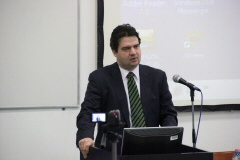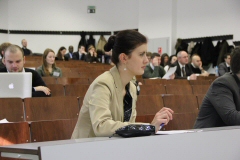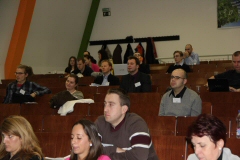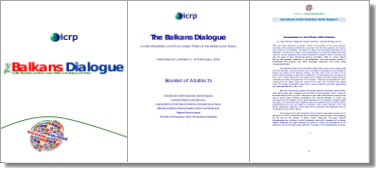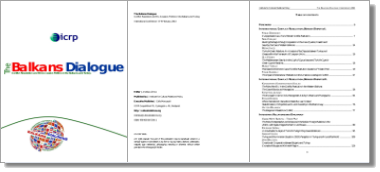The Balkans Dialogue:
Conflict Resolution and EU Accession Politics in the Balkans and Turkey
International Conference – 8−9 February, 2013
Conference topics
Political, economic and legal aspects in ethnic and national minority conflict resolution. Impacts of European Union accession policies/processes. Emerging security challenges.
Aims
This interdisciplinary and cross-cultural meeting welcomes presentations on the political science, sociology, laws, history and economics research and cross border cooperation within the Balkans region and Anatolia. The conference is supported by three institutes and aims to serve as a meeting point to facilitate the public exposure of the perspectives and interests of different communities, governments, international organisations, NGOs, businesses, scholars, thinkers and common citizens.
Booklet of Abstracts [pdf] Conference Proceedings [pdf]
Programme summary
• After the registration and opening ceremony, the following Keynote Speakers will hold their speech.
• Invited speakers:
• H. E. Gordan Grlić Radman, Ambassador of Croatia to Hungary
• H. E. Darko Angelov, Ambassador of Macedonia to Hungary
• H. E. Željko Janjetović, Ambassador of Bosnia and Herzegovina to Hungary
• Edit Lorinczne Bencze, lecturer at Kodolányi János University of Applied Sciences
• Ferenc Bosenbacher, Director, Center for Security and Defense Studies Foundation
• Omer Bilal Almak, President, Dialogue Platform Association, Hungary
• Andras Lorincz, founder of the Institute for Cultural Relations Policy
• Conference days consist of lectures by invited speakers, members of ICRP Advisory Board as well as presentations of guest speakers and Q&A sessions.
• Best presentations will be selected by a panel of judges and awarded during the closing ceremony.
• Submitted and confirmed papers will be published online and will be archived on DVDs.
• The main language of the conference is English (English and Hungarian for guest speaker applicants).
Conference themes
(Possible directions may include, but are not restricted to, the following)
• Cultural and Political Approaches (Country Analysis);
• Regional Development, Transformation Processes, Regional Identities;
• Geography & Governance;
• Diplomacy and Interstate Relations in the Balkans;
• Social Change, Ethnic and Social Issues;
• National and Ethnic Minority Question;
• Diaspora and Kin-state Policies;
• European Union Pre-accession Strategies;
• Economic Processes and International Commerce;
• Interfaith Dialogue, Contemporary Islam in the Balkans;
• Legal Problems of International Relations, International Law Issues, Border Disputes;
• International Conflict Resolution, Regional Security Issues;
• Tendencies and Policies for International Migration. Refugee Resettlement.
Conference location
KJU Budapest Campus, (1139) Budapest, Frangepán utca 50-56. (Map and directions)
Benefits of attending
• The opportunity to present your research within a unique forum and collaborate with experts from wider regions and around the world;
• Conference papers/abstracts are peer-reviewed by members of ICRP international Advisory Board;
• Published papers in electronic format (Proceedings available on DVD and in on ICRP website, where they will remain accessible to thousands of researchers and practitioners worldwide.);
• Get in touch with different views and new approaches;
• A chance to promote your research by presenting it to relevant people and organizations (active politicians, decision-makers, diplomats);
• To get more knowledge about foreign relations of the Balkan countries and Turkey.
• Tea, coffee and refreshments will be served during the program. (Lunch not included in the price)
Tentative conference agenda
| Day 1 | ||
| Time | Mins | Session |
| 0800-0900 | 60 | Registration |
| 0900-0930 | 30 | Opening Session (H.E. Ferenc Bösenbacher and András Lőrincz) |
| 0930-1000 | 30 | Lecture by H.E. Gordan Grlić Radman |
| 1000-1010 | 10 | Q&A, discussion |
| 1010-1020 | 10 | Coffee, tea, refreshments |
| 1020-1050 | 30 | Lecture by Ádám Petheő |
| 1050-1100 | 10 | Q&A, discussion |
| 1100-1110 | 10 | Coffee, tea, refreshments |
| 1110-1140 | 30 | Lecture by H.E. Željko Janjetović |
| 1140-1150 | 10 | Q&A, discussion |
| 1150-1300 | 70 | Lunch |
| 1300-1330 | 30 | Lecture by H.E. Darko Angelov |
| 1330-1340 | 10 | Q&A, discussion |
| 1340-1350 | 10 | Coffee, tea, refreshments |
| 1350-1505 | 75 | Session 1. Role of the European Union; Pre-accession Strategies |
| 1505-1525 | 20 | Q&A, discussion |
| 1525-1545 | 20 | Coffee, tea, refreshments |
| 1545-1700 | 75 | Session 2. International Conflict Resolution; Border Disputes I. |
| 1700-1720 | 20 | Q&A, discussion |
| 1720-1740 | 20 | Coffee, tea, refreshments |
| 1740-1840 | 60 | Session 3. National and Ethnic Minority Question; Ethnic and Social Issues I. |
| 1840-1855 | 15 | Q&A, discussion |
| 2030- | Private dinner for presenters | |
| Day2 | ||
| Time | Mins | Session |
| 0845-1000 | 75 | Session 4. Legal Problems of International Relations; International Law Issues |
| 1000-1020 | 20 | Q&A, discussion |
| 1020-1040 | 20 | Coffee, tea, refreshments |
| 1040-1155 | 75 | Session 5. Interstate Relations and Diplomacy |
| 1155-1215 | 20 | Q&A, discussion |
| 1215-1330 | 75 | Lunch |
| 1330-1445 | 75 | Session 6. Regional Security Issues |
| 1445-1505 | 20 | Q&A, discussion |
| 1505-1530 | 25 | Coffee, tea, refreshments |
| 1530-1630 | 60 | Session 7. National and Ethnic Minority Question; Ethnic and Social Issues II. |
| 1630-1645 | 15 | Q&A, discussion |
| 1645-1705 | 20 | Coffee, tea, refreshments |
| 1705-1805 | 60 | Session 8. International Conflict Resolution; Border Disputes II. |
| 1805-1820 | 15 | Q&A, discussion |
| 1820-1835 | 15 | Closing Session – (Ömer Bilal Almak) |
How to apply for participation?
The application is a two-step procedure and it includes the submission of Registration Form to conference@culturalrelations.organd payment of registration fee (30 EUR). Deadline of submission & payment: 25 January, 2013.
How to apply for English (or Hungarian) paper presentation?
The application is a two-step procedure and it includes the submission of Registration Form to conference@culturalrelations.organd payment of registration fee (60 EUR). Deadline of submission: 4 January, 2013. Authors will be notified of conditional acceptance or rejection within 5 working days after submission. Registration fee shall be paid by bank transfer or cheque prior to event or at the same time as first day registration.
Submitted abstracts will be evaluated by an international reviewing committee.
Authors will be notified of conditional acceptance or rejection in 5 working days after submission
Event organised by the Institute for Cultural Relations Policy in cooperation with Kodolányi János
University of Applied Sciences and Dialogue Platform Association
The event targets a broad spectrum of undergraduate, PhD student, candidate,
lecturer and researcher participants, recognising the multidisciplinarity of
research in international relations and other related disciplines
Authors and titles of accepted papers here >>>>
Notes
• Due to the international epidemic of attempted visa, entry permit, conference registration, and credit card fraud, the conference and its sponsors reserve the right to question any registration request and only honor it on receipt of valid proof of active research, studies or relevant experience in the field of the conference. In case of any issue, the decision will be up to the registration staff and conference organizing committee.
• Registration fees for the full conference include one copy of conference materials and covers the cost of refreshments, and all conference activities. These items are not separately priced. Papers are invited on the topics outlined and others falling within the scope of the meeting.
• Please note that in case of group registration and papers with co-authors all registration fees are per person.
• ICRP is happy to purchase Budapest transportation ticket upon request. A Budapest 24-hour travel card costs 6 euros and Budapest 72-hour travel card costs 15 euros. If you would like us to buy any of these travel cards for you please transfer the additional sum (6 or 15 euros) with the participation cost. Please transfer the accommodation and transportation cost together with the participation cost.
Abstracts and oral presentation
• Papers are invited on the topics outlined and others falling within the scope of the meeting. Abstracts of no more than 3,000 words. Abstracts should clearly state the purpose, results and conclusions of the work to be described in the final paper.
• Paper of no more than 40,000 characters. Abstracts should be sent by e-mail at the following e-mail address:conference@culturalrelations.org)
• 20 minutes for presentation. Q/A session: 15 minutes maximum.
• Use Microsoft PowerPoint for your presentation.
Find Event on Facebook
Downloads
Participant and Speaker Registration Form [English]
Regisztracios lap [Hungarian]Conference Brochure [English]
Konferencia felhivas [Hungarian]
Bank transfer information
Registration fees shall be paid by bank transfer or cheque. Please use the corresponding information below (please enter your name (or name of institution) as the payment reference):
The ICRP Bank Account:
Payee: ICRP Geopolitika Kft.
Address: Gyongyosi u. 45., 1131 Budapest, Hungary
Bank: K&H Bank
Address: H-1095, Budapest, Lechner Odon fasor 9.
For international transfers
International Bank Account Number (IBAN): HU78 1040 4065 5052 6668 8677 1005
Bank Identifier Code (BIC/SWIFT): OKHBHUHB
Chips Univ Id.: 295491 (Additional Routing codes)
For transfers within Hungary
Account Number: Kereskedelmi es Hitelbank 10404065-50526668-86771005
Cheques
Cheques payable to the Institute for Cultural Relations Policy could be sent to the following postal address:
● Csilla u. 7., 2030 Erd, Hungary
International Conference venue
Kodolányi János University of Applied Sciences
The Conference venue is located in the heart of the 13rd district, on Frangepán utca.
ICRP is happy to purchase Budapest transportation ticket upon request. A Budapest 24-hour travel card costs 6 euros and Budapest 72-hour travel card costs 15 euros. If you would like us to buy any of these travel cards for you please transfer the additional sum (6 or 15 euros) with the participation cost. Please transfer the accommodation and transportation cost together with the participation cost.
Public transport ticket information >>>
By tram:
• tram nr. 14 to Frangepán utca from Lehel tér.
• tram nr. 1 to Lehel street and 2 stops from there with tram nr. 14 to Frengepán utca.
By underground:
• take the Metro line 3 to Lehel tér and then tram nr. 14 to Frangepán utca.
• take the Metro line 3 to Árpád híd, take 2 stops with tram nr. 1 and then 2 stops with tram nr. 14 to Frangepán utca.
• take the Metro line 3 to Gyöngyösi utca, then take 5 stops with bus nr. 105 to Frangepán utca.
By bus:
• bus nr. 105 (from Buda or from Árpád híd metro stop).
By car:
• 10 minutes away from the city centre
• 3 minutes from the M3 motorway that leads directly to the Hungaroring and the Eastern part of the country.
GPS coordinates:
N 47 32.051
E 19 04.870
We are looking forward to welcoming You here!
Contact us:
Email: institute@culturalrelations.org
The Balkans Dialogue
List of presenters and sessions:
| █ International Conflict Resolution; Border Disputes I. |
|
| Dr. Füsun Özerdem: | Europeanisation as a Tool of Border Conflict Resolution |
| Saša Čvrljak: | Building the region through cooperation in the area of justice, freedom and security: the case of Western Balkans |
| Merve İnce: |
Turkish-Greek Relations: An Analysis of the Disputes between Turkey and Greece within the Framework of European Union |
| Dr. Ulvi Keser: | The Mediterranean Security in the Light of Cyprus Issue and Turkish Cypriot-Greek Cypriot Relations |
| Murat Yümlü (in absentia): | Post-Second World War Case of Conflict Resolution: Question of Trieste |
| Fidan Karimli: | The Impact of International Mediation on the Armenian-Azerbaijani Conflict |
| █ International Conflict Resolution; Border Disputes II. |
|
| Konstantin Kolev: | The Role of the EU in the Conflict Resolution in the Western Balkans. The case of Bosnia and Herzegovina |
| dr. Krisztina Juhász: | The European Union’s crisis management activity in Bosnia and Herzegovina |
| Edgár Dobos: | When international intervention meets the local context: state-formation, ethnopolitics and local ownership in the Bosnian way |
| Viktor Milanov: | The Bulgarian-Macedonian Conflict |
| █ Interstate Relations and Diplomacy |
|
| Dr. Csaba Máté Sarnyai & Tibor Pap: | The role of interpretation and discourse in the Serbian foreign relations in the 2010’s, with special regard to the EU and Russia |
| Dr. Emirhan Göral: | A Neo-realist Analysis of Turkish Foreign Policy Towards Balkans |
| Gábor Fodor: | Turkey and the Armenian Question: 1915’s perception in Turkey and around the world |
| Jānis Balodis: | Cross border co-operation between Bulgaria and Turkey: example of Burgas and Kirkraleli region |
| Mladen Karadjoski: | Cross-border cooperation between Macedonia and Greece as an instrument for good neighbourhood relations |
| █ Legal problems of international relations; International Law Issues |
|
| Stefano Braghiroli & Irena Fiket: | Brussels is well worth a Mass: Assessing the impact of EU-sponsored legislation on minority rights in the Western Balkans |
| Ida Orzechowska: | The activities of the ICTY as an intervening variable in the EU enlargement processes in the Western Balkan region |
| Melih Uğraş Erol: | Violated Human Rights and Freedoms near the EU: Analysing the Turkish Alevi Community’s Human Rights Position in the Process of EU Accession |
| Ekrem Eddy Güzeldere: | The Greeks of Istanbul and EU harmonization |
| Claire Griffith: | Home Sweet Home?: The Right of Return in Post-War Bosnia and Herzegovina |
| █ National and Ethnic Minority Question; Ethnic and Social Issues I. |
|
| Andreea Andrada Vişan & Viţelaru Ana-Adina: | The social model and the economic security in Europe |
| Lea Prijon: | Instabilities in Slovenian Society: Towards the Past or the future? |
| Xhyla Çeliku & Prof. Dr. Fehari Ramadani: | The Ohrid Framework Agreement as a preventive document for the stability of Macedonia |
| Solveiga Inokaitytė: | Kosovo’s territorial dependence reflection in Serbian political parties discourses |
| █ National and Ethnic Minority Question; Ethnic and Social Issues II. |
|
| Lulzim Murtezani: | Multicultural education as a reality: psychological premise |
| Prof. Dr. Arbër Çeliku & Prof. Dr. Vullnet Ameti: | The learning of the other’s language and cultural corpus, a premise for a successful interethnic communication in Macedonia |
| Faruk Ekmekci: | Social trust, democracy, and the Kurdish issue in Turkey |
| Davut Han Aslan: | Turkey’s Kurdish Paradox under AKP: EU Processes versus Emerging Security Challenges |
| █ Regional Security Issues |
|
| Romina Beqiri: | Witness Protection and European Security |
| Dr. Habil. Norbert Pap & József Négyesi: | Hungarian role in the Western Balkan security issues |
| Ourania Dimitraki: | The Cost for Peace: Military Expenditure and Economic Growth in Western Balkans |
| dr. Csaba Németh: | About the current aspects of the EULEX Kosovo mission |
| Nicasia Picciano: | The EU Common Security and Defence Policy Achilles´ heel: North Kosovo |
| █ The Role of the European Union; Pre-Accession Strategies |
|
| Dr. Edit Lőrinczné Bencze: | The new phase of the integration process: Croatia’s accession |
| Cedric Pulliam: | Reconstruction of the Balkans Region: A Research Study of the Future of European Integration of Bosnia-Herzegovina and Serbia |
| Özden Melis Uluğ: | “Turkey should solve its Kurdish conflict first”: The impact of the EU on the Kurdish conflict in Turkey |
| Yılmaz Kaplan: | Regional or global European Union? Turkish membership as a test |
| Didar Erdinç & Emilia Zankina:
|
Only an EU Apart: Bulgarian-Turkish Economic and Political Relations in the Post-Accession period |

